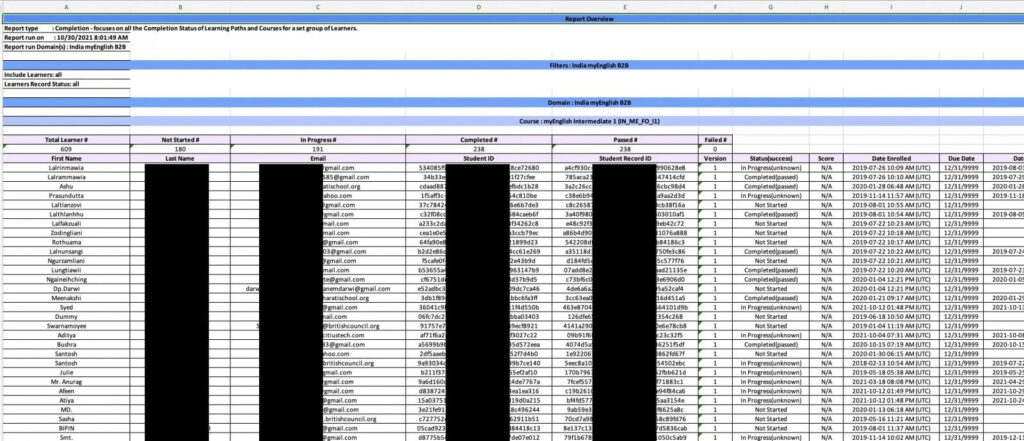More than 100,000 files with student records belonging to British Council were found exposed online.
An unsecured Microsoft Azure blob discovered on the internet by a cybersecurity firm revealed student names, IDs, usernames and email addresses, and other personal information.
British Council promotes the study of British culture and the English language around the world and is known for administering the IELTS standardized language exam.
Unsecured Azure blob spills Excel, XML, JSON files
British Council, the global organization for promoting British culture, the English language, and education opportunities, was leaking over 144,000 files containing student records.
Cyber security firm Clario, along with security researcher Bob Diachenko discovered the leak in December 2021 and immediately reported their findings to British Council.
Spread across more than 100 countries, British Council has previously been dubbed the ‘soft power‘ arm of the UK foreign policy. Although partially funded by the UK Government via a grant, the independently operated non-profit generates the vast majority of its revenue from activities like teaching, exams, tendered contracts, and partnerships.
The organization also administers the International English Language Testing System (IELTS) exam, the most recognized standardized English language test around the world, alongside TOEFL.
According to the researchers, an unprotected Azure blob container was indexed by a public search engine and contained thousands of Excel spreadsheets and XML/JSON files, viewable by anyone.
These files had the personal information of hundreds of thousands of British Council English course learners and students from around the world.

The exposed information as seen above, included:
- Full name
- Email address
- Student ID
- Student status
- Enrollment dates
- Duration of study
- Notes
It isn’t known for how long was this data available online to the public, with no authentication in place, state the researchers.
British Council: 10,000 records held by third-party provider
Diachenko and Clario discovered the data leak on December 5th, 2021, and promptly notified British Council.
One of the main concerns the researchers had at the time was the risk from phishing actors and identity thieves—should they get their hands on this information.
After not hearing back for 48 hours from British Council, the researchers reattempted contact; this time via Twitter, which is where subsequent communication between the two parties took place.
“On December 23rd, 2021 (two weeks after the initial contact), confirmation around the security of the repository was announced,” state the researchers.
British Council Statement
“The data in question was held and processed by a third party service provider. Approximately 10,000 records were accessible in a way that should not have occurred. On becoming aware of this, our third party service provider immediately secured the records with appropriate controls and the data in question was rendered no longer accessible. We are working with the supplier to ensure similar incidents do not happen in the future.
We have reported the incident in accordance with our regulatory obligations and we remain in contact with the Information Commissioner’s Office should any further action be required.
The British Council takes its responsibilities under the Data Protection Act 2018 and General Data Protection Regulations (GDPR) very seriously. The privacy and security of personal information is paramount,” a British Council spokesperson told BleepingComputer.
As noted, although the researchers discovered over 144,000 files, according to British Council, just about 10,000 student records were affected.
The disclosure of this data leak follows a last month’s report stating British Council had been a victim of “two successful ransomware attacks over the past five years,” in addition to six unsuccessful attempts by ransomware ops.
As a result of these attacks, British Council had reportedly experienced 12 days of downtime in total—five days in the first case, and seven in the second. However, the organization didn’t pay a ransom either time.
Given the prominent place held by the British Council in promoting UK culture abroad, and its role in co-managing the IELTS exam, it isn’t hard to see why threat actors would be lured to target the institution.
Clario recommends British Council students and test-takers to keep an eye out for any suspicious phishing emails they may receive, and to change their login passwords immediately as an extra precaution.
You may also enjoy reading, The largest DDoS to date, Microsoft mitigates a 3.47 Tbps DDoS attack
Stay informed of the latest Cybersecurity trends, threats and developments. Sign up for RiSec Weekly Cybersecurity Newsletter Today
Remember, CyberSecurity Starts With You!
- Globally, 30,000 websites are hacked daily.
- 64% of companies worldwide have experienced at least one form of a cyber attack.
- There were 20M breached records in March 2021.
- In 2020, ransomware cases grew by 150%.
- Email is responsible for around 94% of all malware.
- Every 39 seconds, there is a new attack somewhere on the web.
- An average of around 24,000 malicious mobile apps are blocked daily on the internet.




